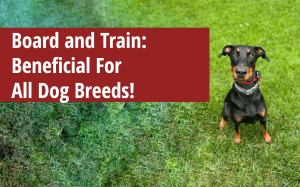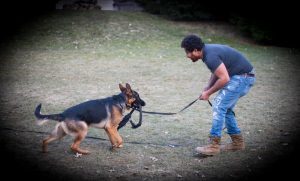You step outside and call your dog’s name, expecting them to come bounding toward you. Instead, they sniff a tree, chase a squirrel, or ignore you completely. If this sounds familiar, you’re not alone. Poor recall, when a dog doesn’t come when called, is one of the most common dog behavior problems that dog owners bring up during training consultations in Pittsburgh, Bridgeville, and South Hills.
While frustrating, this behavior isn’t personal or defiant. It’s a sign that your dog’s recall training needs more structure, clarity, and consistency. At Spitze K9, we understand how confusing and emotionally taxing this can be. That’s why we’re here to help you break down the issue, understand what’s behind it, and learn how to improve it.
Why A Dog’s Recallability Matters
A strong recall does more than prevent annoyance. It directly affects your dog’s safety, freedom, and quality of life. A reliable recall can stop your dog from running into traffic, getting into unsafe areas, or becoming separated from you during off-leash hikes.
In Pittsburgh, where many parks, neighborhoods, and trails offer opportunities for leash-free adventures, recall is essential for your dog’s participation in daily life. Dogs with dependable recall enjoy more freedom, and owners gain confidence and peace of mind.
Without recall, dog owners often feel anxious or restricted. Walking your dog becomes a chore rather than a bonding experience, and letting them off-leash may feel impossible. But with the proper guidance, even dogs with no current recall response can learn to return reliably when called.
Why Your Dog Won’t Come When Called
Understanding why your dog ignores recall commands is the first step toward fixing the issue. Here are some of the most common behavioral and situational reasons behind poor recall:
1. Lack of Motivation or Reward
Dogs repeat behaviors that result in something they enjoy. If coming when called doesn’t lead to a positive experience, like treats, praise, or play, your dog might not see the point.
2. Negative Associations
Has your dog ever been called, then scolded, or put directly into a crate? If so, it may associate “come” with unpleasant outcomes, which, over time, creates avoidance.
3. Inconsistent Training
If your dog is sometimes rewarded for coming, sometimes ignored, and sometimes punished, the mixed signals can confuse it. Consistency is critical for dogs to understand and trust a cue.
4. High-Distraction Environments
Squirrels, other dogs, joggers, smells, and noises all can overpower your voice if your dog hasn’t been trained to respond under distraction. Just because your dog comes reliably in your backyard doesn’t mean they’ll do the same at a busy park.
5. Fear, Confusion, or Anxiety
Some dogs hesitate because they’re unsure of what’s expected of them. If your tone or body language is harsh or hurried, a nervous dog might freeze or flee instead of approaching.
Training Mistakes to Avoid
A stubborn dog rarely causes recall issues. More often, they come from how the training is structured or how the cue has been unintentionally undermined. Avoiding these common training mistakes can drastically improve your results:
1. Only Calling When Fun Ends
If your dog learns that “come” signals the end of play or an immediate trip home, it will start avoiding it. Mix it up. Call your dog during playtime, reward them, and then let them go play again.
2. Repeating the Command
Repeating “come” multiple times teaches your dog that they don’t need to respond right away. Instead, say the command once and wait. If they don’t respond, reset the exercise and reduce distractions.
3. Punishing After Recall
If your dog comes to you and you respond with frustration, especially after they’ve taken a long time, your dog learns that coming back leads to negativity. Always reward your dog for returning, even if you’re frustrated.
4. Using an Angry Tone
Your dog reads your tone just as much as your words. A calm, cheerful voice invites your dog in. A loud, stern tone may make them hesitate or avoid you altogether.
5. Expecting Obedience Without Practice
Coming when called is not instinctual. It requires training, repetition, and reinforcement, especially when distractions are involved.
When to Seek Professional Help
If your dog still refuses to come when called despite your efforts, it may be time to seek professional support. Here are a few signs that recall training would benefit from expert guidance:
- Your dog ignores recall outdoors, even in fenced areas
- You feel unsure how to structure training sessions
- Your dog shows fear, anxiety, or aggression when called
- You’re worried about safety during off-leash activities
- You want faster, more consistent progress with less frustration
Trainers can help assess your dog’s behavior, customize a plan, and show you how to apply techniques effectively. They can also help identify underlying problems like reactivity, nervousness, or lack of confidence that might be interfering with recall.
Dog Training Programs in Pittsburgh That Can Help
At Spitze K9, we understand how discouraging it can be when your dog doesn’t come when called. Our dog training programs in Pittsburgh are designed to help owners like you build clear, consistent communication and improve your dog’s responsiveness, even in high-distraction environments.
We work with dogs of all ages, breeds, and personalities. Whether your dog is highly energetic, nervous, stubborn, or reactive, we tailor training to their specific needs.
Group Classes
Group sessions provide structured training alongside other dogs and people, which helps generalize recall in distracting environments. These classes are ideal for dogs who need exposure, socialization, and steady progress in a supportive setting.
1-on-1 Training
If your dog needs more individualized attention, private lessons allow for targeted recall work at home or in real-world environments. One-on-one coaching ensures we address your specific challenges and training goals.
Our service area includes Bridgeville, South Hills, and greater Pittsburgh. Whether you’re starting from scratch or want to fine-tune existing skills, we’re here to help make recall a reliable and rewarding experience for both you and your dog.
Board and Train Classes
For dogs in need of serious training, we offer board and train classes for dogs where they can stay with us for a couple weeks and receive continuous training at our facility to work on recall, and other commands and behaviors were they show room for improvement.
Success Stories from Local Clients
Many of our clients began training with the same frustration you may be feeling right now. They worried their dog was untrainable, too distracted, or didn’t care. But with time, structure, and guidance, they’ve transformed their dogs’ responsiveness and strengthened their bond.
We invite you to read their stories on our testimonials page. From first-time dog owners to those struggling with rescues or reactive dogs, we’ve helped countless Pittsburgh families regain confidence and control during walks, hikes, and playtime.
A Better Relationship with Your Pet Starts with Better Recall
A dog’s recall isn’t just about obedience. It’s about trust, communication, and safety. While it may feel overwhelming at times, remember that recall is a trained behavior, not an innate one. Every dog can improve with the right dog obedience training approach and support.
If you’re feeling stuck, discouraged, or unsure of what to do next, you’re not alone, and you don’t have to figure it out alone. At Spitze K9, we can provide you with expert training tips for stubborn dogs.
Take the next step toward a safer, more connected relationship with your dog. Contact Spitze K9 today to learn how our personalized dog recall training can help your dog come running back every time you call.








